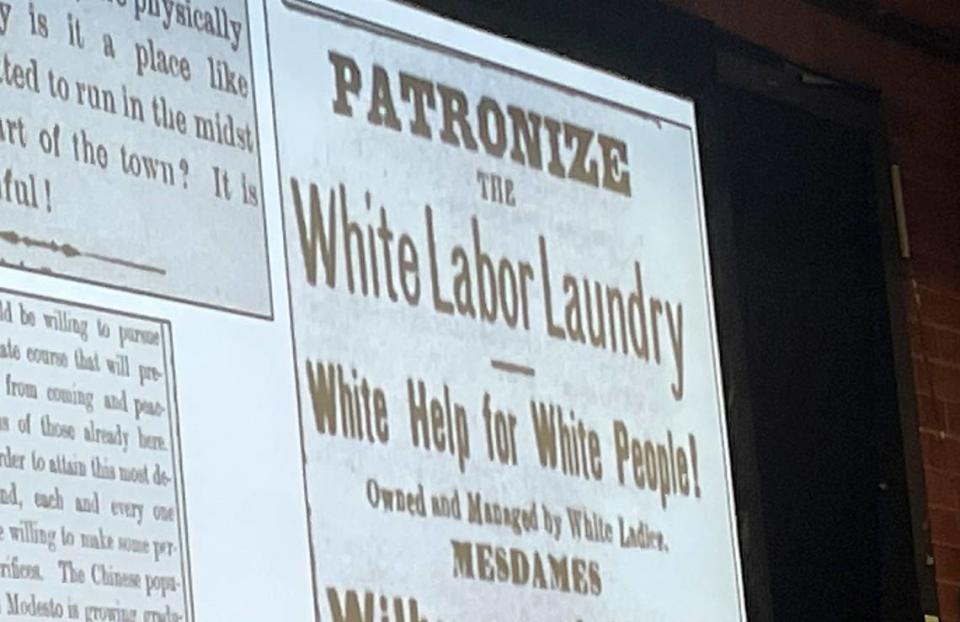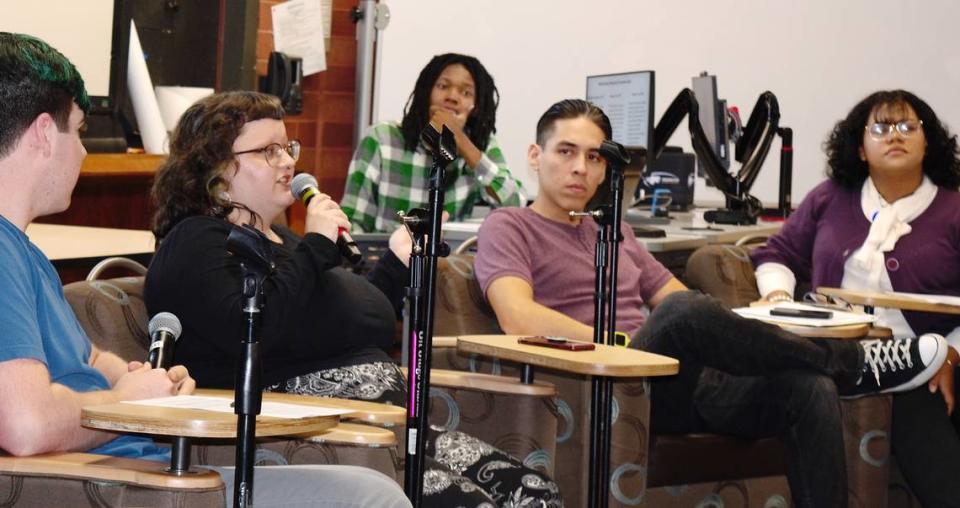Modesto JC students research history of housing segregation. They want to hear from affected
Seven students at Modesto Junior College have explored the city’s history of keeping racial minorities from living where they pleased.
They learned of housing segregation in the 1880s, when Chinese immigrants were targeted. It continued in the 1900s for Latino, Black and other groups, who still feel the effects today.
Five of the students spoke Monday, Oct. 23, as part of a multi-week series of public events at MJC and two branches of the Stanislaus County Library.
Much of their attention was on the practice, starting in 1917, of placing covenants on some home deeds that bar minority ownership. This happened across the United States until a federal ban in 1968.
“The restrictions created white, middle-class neighborhoods that purposely excluded people of color,” student Jaime Venegas said in an East Campus lecture hall.
The panel also featured Kiarra Dixon, Kalvin Douglas, Brianna Leigh and Robin Siefkin. Two other student researchers, Alex Hamiel and Samantha Ho, were not on hand.

The seven have done the work since last spring under internships with history professor Eva Mo and instructor Eileen Kerr. The students have a variety of majors and racial backgrounds.
The portion on home deeds built on research by David and Sharon Froba of Modesto, chronicled by The Modesto Bee starting in 2019.
The students learned that local real estate agents encouraged the racial covenants, and that The Bee ran ads indicating these areas. The discrimination was abetted by a New Deal policy that made mortgages cheaper for whites vs. minorities.
As part of the project, the students read “The Color of Law,” a 2017 book by UC Berkeley researcher Richard Rothstein. He argued that racial deed restrictions account for much of today’s large disparity in net worth between white and minority families. That wealth is primarily in the value of homes inherited by children.
The MJC students pored through old deeds at the Stanislaus County Recorder’s Office and searched the Bee archive via newspapers.com.
They looked also into how the restrictions forced minorities to live in parts of town that to this day remain poor. They include the mostly Latino areas of west and south Modesto.
Airport neighborhood has unusual story
The airport neighborhood has a similar history, but with a twist, as described by Siefkin. The area was established in the late 1930s by white migrants from Dust Bowl states. They built small houses out of discarded materials and had little income amid the Depression.
Even here, some of the deeds forbade minorities from owning properties, Siefkin said.
“Although the white migrants that lived in the airport district were not higher white middle class, the color of their skin still provided them some kind of privilege,” he said.
Today, the airport neighborhood is mostly Latino and low-income, like west and south Modesto. All three areas have some blocks still lacking sidewalks, storm drains and other amenities.
Although racial covenants are now illegal, they remain on many deeds around the nation. California passed a 2021 law that requires county recorders to locate and redact all of them. Stanislaus launched the multi-year process in March.

Bias in Modesto’s old Chinatown
Leigh talked about the long-gone Chinatown near Eighth and G streets in Modesto — home to nearly 900 people in the 1880s.
The city passed a law requiring that Chinese-owned laundries be on the rougher west side of the railroad tracks. Leigh said this had the effect of segregating housing, too, because these owners tended to live above their businesses.
A newspaper clipping at the time captured the mood. It urged readers to instead patronize laundries that offered “white help for white people.”
Leigh, who is white, said the project allowed her to speak for long-dead Asians whose voices were not on those newspaper pages. “Any stories about them were really suppressed,” she said. “You can’t really find a lot of information about who specifically lived there.”
The students continue to seek local people who can talk about how past housing discrimination has affected their families. Emails can be sent to their instructor at kerre@yosemite.edu.

Other housing events lie ahead
MJC organized the housing events as part of its Democracy and the Public Space program, held each fall and spring semester.
The current series began with a Sept. 28 screening of “Owned,” a film about housing inequality. Local leaders took part in an Oct. 9 panel on the lack of affordable homes here. An Oct. 16 event dealt with environmental issues tied to inadequate housing.
The rest of the schedule:
Monday, Oct: 30, 1 p.m., in the Forum building on the East Campus. The topic is “real world stories of real estate discrimination.” The panel includes broker Lionel Akpovi of Redwood Real Estate Group; English professor Chandra Howard and history professor Marvin Jackson; and Dejeuné Shelton, director of career services at MJC. The latter three are leaders in a student support group called Umoja, which means “unity” in the Kiswahili language of Africa.
Nov. 4, 11 a.m., Salida branch library, 4835 Sisk Road. Patrons will discuss “Just Action” by Leah Rothstein in advance of her Nov. 16 visit to MJC. She is the daughter of Richard Rothstein and collaborated with him on this follow-up to “The Color of Law.”
Nov. 8, 6:30 p.m. The Turlock branch library will host a “Just Action” discussion. It’s at 550 N. Minaret Ave.
Nov. 15, noon. The book will be discussed in the MJC Learning and Library Center on the East Campus.
Nov. 16, 7 p.m.: Leah Rothstein will speak on “Just Action” in Sierra Hall on the West Campus. The book describes how to challenge the inequality that remains in housing.

